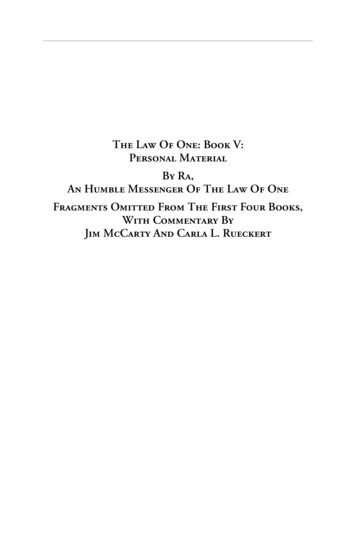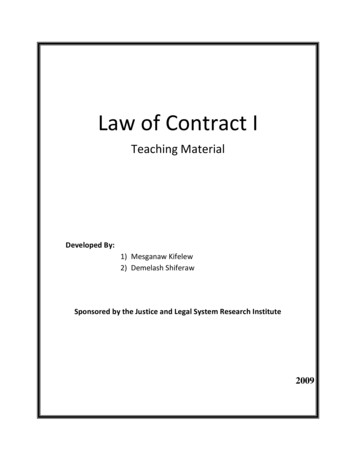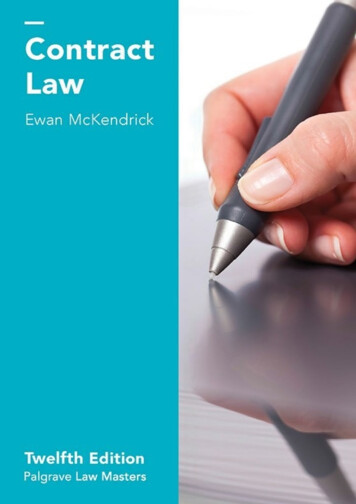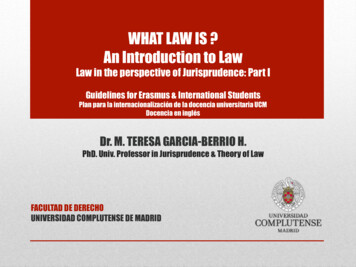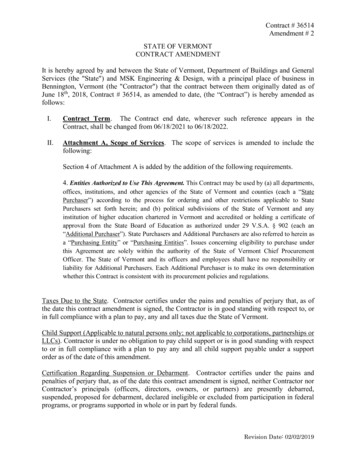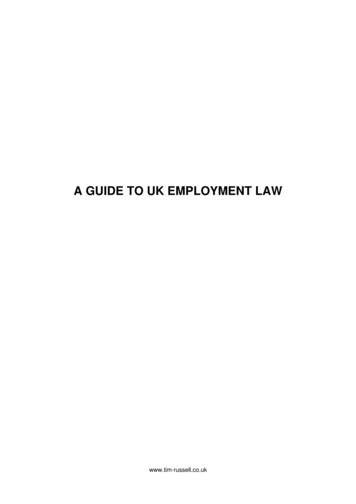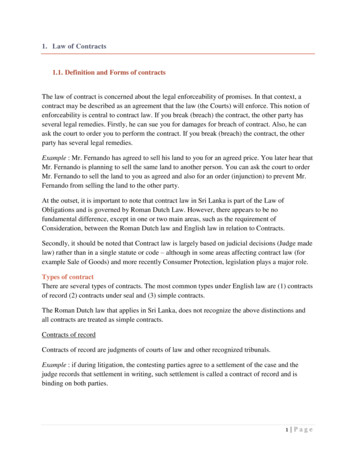
Transcription
Continue
Law of contract book by avtar singh pdf free downloadOverview: Textbook on Law of Contract and Specific Relief by Dr Avtar Singh deals with the Contract Act, 1872 and the Specific Relief Act, 1963. The present seventh edition has been thoroughly revised and updated.The work provides the information of all the leading statutory provisions and judicial pronouncements in a condensed manner.Principlesemerging from court decisions have been brought out and laid bare for the reader. The Specific Relief Act has undergone major amendments.The specific relief used to be a discretionary remedy. Now it has been elevated to the position of a general remedy. Textbook on Law of Contract and Specific Relief by Dr Avtar Singh deals with the Contract Act, 1872and the Specific Relief Act, 1963. The purpose of Contract Act is to lay down principles for formation of contractual relations and to provide the remedial measure of recovery of damages in the event of one party’s failure to keep his contractual commitments. The Specific Relief Act provides the remedial measures for forcing parties to perform their actualcontractual commitments and not to get rid of them by just paying compensation for their acts. The following are the notable features of this new edition: Latest decisions of Supreme Court, High Court and foreign jurisdictions included. Specific Relief (Amendment) Act, 2018 discussed and analysed. Dr Avtar Singh’s work on contract has been extolled byreaders and reviewers in India and abroad, due to the clear enunciation of principles, simple language and up-to-date case law and material given therein. This book is highly recommended for students of law, commerce and management; those appearing in competitive examinations and for those pursuing courses such as ICWA, CA and CS. ". AvtarSingh, a distinguished author"- Law Books in Review, U.S.A. ". Dr. Avtar Singh writes with an ease and simplicity that holds the attention of the reader."- Cochin University Law Review ". Avtar Singh displays an amazing capacity. It goes to his credit for presenting a comprehensive picture reflecting clarity of thought and analysis of the subject."- Lex EtJuris ".Concepts clarity is good, language used in the book is excellent".-- Dr. V.Visalakshi, Associate Professor(Law), Dr. Ram Manohar Lohiya National Law University. ".Very good quality book helpful to understand the concepts of Law of Contract."-- Dr. Rakesh Kumar Handa, Asst. Professor Law, USLLS, Guru Gobind Singh Indraprastha University.".The most authoritative book that can now be carried in the pocket. Has dealt with the intracacies in a short and straightforward manner."- Niyati Pandey, Assistant Prof. of Law, GNLU, Gujarat ".Dr. Avtar Singh is a well known personality, academician. The clearly in concept, simple language and updated cases makes his book popular with readers".Kusum Lata, Assistant Prof. Delhi Technological University. Textbook on Law of Contract and Specific Relief by Dr. Avtar Singh deals with the Contract Act, 1872 and the Specific Relief Act, 1963. The purpose of Contract Act is to lay down principles for formation of contractual relations and to provide the remedial measure of recovery of damages in theevent of one party’s failure to keep his contractual commitments. The Specific Relief Act provides the remedial measures for forcing parties to perform their actual contractual commitments and not avoid performance by just paying compensation for their acts. The Specific Relief Act itself has undergone major amendments. The following are the notablefeatures of this new edition: Latest decisions of Supreme Court, High Court and foreign jurisdictions included. Specific Relief (Amendment) Act, 2018 discussed and analysed. Also included are additional learning resources on www.ebcexplorer.com : Access to important case law as indicated by Case PilotTM. Discussion ForumTM to post comments, discussand explore ideas. SCC Online Blog to stay updated on recent happenings of the legal world. Useful LinksTM to get access to a compilation of free resources. Dr. Avtar Singh’s work on Contract and Specific Relief has been extolled by readers and reviewers in India and abroad, due to the clear enunciation of principles, simple language and up-to-datecase law and material given therein. This book is highly recommended for students of law, commerce and management; those appearing in competitive examinations and for those pursuing courses such as ICWA, CA and CS. The book can be purchased here Previous 1 2 3 . 6 Next Visit the help section or contact us Something went wrong. Wait amoment and try again. r Avtar O CONTRACT & SPECIFIC RELIEF Avtar Singh Twelfth Edition 24616409,0110525171 ' J (MO) 6G337576, 66320757. 9392075757 9392075757 ORDEB ONLINE All „ Oook. t suso r« www.iawrels.com Oaa rwCafD No17799075753 IfOlK Pt?55l1C? m, TI!« Woffl T? IJS. Do W« Ami,, 1 J Law College Notes & StuffsExclusive group for Law Students Join Us Here for More Materials Law College Notes & Stuffs LAW OF CONTRACT ' V. J and Specific Relief } I By the same author. Law of Arbitration and Conciliation Laws of Banking and Negotiable Instruments Law of Carriage (Air, Land and Sea) Business Law (Principles of Mercantile Law) Introduction to Company LawCompany Law Competition Law Consumer Protection: Law and Practice Contract Law (Easy Law Series) Textbook on Law of Contract and Specific Relief Law of Insolvency Law of Insurance Intellectual Property LawNegotiable Instruments Introduction to Law of Negotiable Instruments Law of Partnership (Principles, Practice & Taxation) Introduction toPartnership (including Limited Liability Partnership) Law of Sale of Goods P.S.A. PiLLAi's Law of Tort [Ed] Works in Hindi: Bank Kari Vidhi evam Parkramya Likhat Adhiniyam Bhagidari Vidhi evam Seemit Dayetav Bhagidari Adhiniyam Company Vidhi Company Vidhi (Ek Parichay) Madhyastham, Sulah evam Anukalpi Vivad Niptan Vidhi Mal Vikraya evamAvkraya Vidhi Parkramya Likhat Samvida Vidhi Ke Sidhant Tatha Vinirdisht Anutosh Adihiniyam, 1963 Samvida Vidhi Evam Vinirdisht Anutosh Adhiniyam—Ek Parichay Vanijyik Vidhi ke Sidhant ViDHiK Upchar—Legal Remedies Law pPContract EBC 9- Explorer" companion resources for legal.research arid Specific Relief Free online suppor,ting resourcesat ebcexplorer.com Learn with EBC Explorer EBC Explorer is a companion website to Law of Contract and Specific Relief It provides access to the most important cases referred to in your book; along w ith updates, blogs, a discussion forum and a host of free learning resources. Connected to the premium database of SCC Online , the Case Pilot' ' feature helps you retrieve cases instantly. Combining the best of the print and the vv eb, the EBC Explorer helps you stay ahead, always! Inside EBC Explorer -TM ' Complimentary access to primary materials,** Powered by see Online CASE PILOT Get One Year Access to Cases!"' — Use our Case Pilot feature to get quick access to the mostimportant cases on the premium database of SCC Online . Connect directly to the relevant case with just one click. Browse Through Statutes! — Get access to updated statutory content on SCC Online through the Statute Pilot feature! STATUTE PILOT DISCUSSION FORUM Discuss. Debate. Learn. — Post comments, discuss issues, explore ideas, orif you are stuck post a comment for the author or someone more experienced for help. Discussion Forum' ' feature provides an excellent forum for discussing legal issues outside the classroom or courtroom. USEFUL LINKS Read Articles and Blogs! — Use our Useful Links feature to get access to a compilation of free resources selected by the editors.Discover books, articles, blogs and links to free databases on the internet. * Conditions apply. * Features included may vary from book to book! Find Book Content Online! — Find a compilation of essay type, BOOK RESOURCES see ONLINE BLOG UPDATES CRACK-IT FACULTY INTERVIEWS/ LECTURES 97, lOO MOCK TESTS problem based andmultiple choice questions as well as exam tips for preparation for your exams. Also look up important terms and their meanings. Keep Up-to-date! — Get an insight into the latest happenings of the legal world with the SCC Online Blog. Stay updated with current changes in law and read news briefs on latest cases. Also get notified about upcomingseminars and conferences. Get Access to Book Supplements! — Use the Updates feature to access timely book supplements whenever available. Updates are prepared by Eastern Book Company's professional team of editors who ensure that you are never left behind. Crack the Tests! — Think you are well prepared? Take our unique interactive tests toknow where you stand. Use our Crack-It feature and get instant results! Post the results on Facebook! Resources for the Faculty! — Plan your lectures by using our Faculty Resources feature. Find syllabus, reading lists etc. along with notes and guidelines by the author on how to teach the subject. Watch and Learn with Videos! — Browse through ourexclusive compilation of videos using our Interviews/Lectures ' feature. Listen to lectures from professors, and other exciting videos. Test Yourself!—Stay ahead of your class by taking tests and exams on the Mock Tests feature of EBC Explorer! Take timed tests and evaluate your performance! That's not all! We are constantly updating our database withnew features and information. Keep visiting ebcexplorer.com for new and exciting updates! V re Get a glimpse of Online Resources! Turn to the end of the book for further details of the EBC Explorer ' online resources for this book. LAW OF CONTRACT (A Study of the Contract Act, 1872) and Specific Relief Dr Avtar Singh Advocate BCom, LLM, LLD,(Lucknow), Saraswati Samman (UP Govt.) Vidya Bhushan (Hindi Sansthan, UP) Ex-Visiting Professor of Business Laws, IIM, Lucknow Ex-Reader in Law, Lucknow University Lucknow I Delhi Allahabad Bangalore Ahmedabad Nagpur E3C Website: www.ebc.co.in, E-mail: [email protected] Lucknow (H.O.): 34, Lalbagh, Lucknow-226 001 Phones: 91522-4033600 (30 lines), Fax: 91-522-4033633 New Delhi: 5-B, Atma Ram House, 5th Floor 1 1, Tolstoy Marg, Connaught Place, New Delhi-110 001 Phones; 91-11-45752323, 91-9871197119, Fax: 91-11-41504440 Delhi: 1267, Kashmere Gate, Old Hindu College Building, Delhi-110 006 Phones: 91-11-23917616, 91-9313080904, Fax: 91-1123921656 Bangalore: 25/1, Anand Nivas, 3rd Cross, 6th Main, Gandhinagar, Bangalore-560 009, Phone: 91-80-41225368 Allahabad: Manav Law House, Law Publishers & Booksellers, Near Prithvi Garden, Opp. Dr. Chandra's EyeClinic, Elgin Road, CivilLines, Allahabad-211 001 Phones: 91-532-2400877, 2422023, Fax: 91-532-2623584 Ahmedabad:Satyamev Complex-1, Ground Floor, Shop No. 7 Opp. High Court Gate No. 2 (Golden Jubilee Gate) Sarkhej—Gaiidhinagar Highway Road, Sola, Ahmedabad-380 060 Phones: 91-9228012539, 91-7567903245 Nagpur: F-9, Girish Heights, Near LIC Square, Kamptee Road, Nagpur-440 001 Phones: 91-712-6607650, 91-7028924969www.facebook.com/easternbookcompany www.twitter.com/ebcindia Shop online at: www.ebcwebstore.com First Edition, Second Edition, Third Edition, Fourth Edition, Fifth Edition, Sixth Edition, 1973 1976 1980 1985 1989 1994 Seventh Edition, Eighth Edition, Ninth Edition, Reprinted, Tenth Edition, Reprinted, 1999 Eleventh Edition, 2013 2002 Reprinted,Twelfth Edition, Reprinted, Reprinted, 2016 2005 2006 2008 2017 2018 2019 2010 Reprinted, 2020 9 789388 822893 All rights reserved. No part of this work may be copied, reproduced, adapted, abridged or translated, stored in any retrieval system, computer system, photographic or other system or transmitted in any form by any means whetherelectronic, mechanical, digital, optical, photographic or otherwise without a prior written permission of the copyright holders, EBC Publishing (P) Ltd., Lucknow. Any breach will entail legal action and prosecution without further notice. This book is sold subject to the condition that it, or any part of it, shall not by way of trade or otherwise, be sold, lent, re-sold,displayed, advertised or otherwise circulated, without the publishers' prior written consent, in any form of binding, cover or title other than that in which it is published and without a similar condition including this condition being imposed on the subsequent purchaser(s). Any breach of any of these rights or conditions will entail civil and criminal action withoutfurther notice. While every effort has been made to avoid any mistake or omission, this publication is being sold on the condition and understanding that neither the author nor the publishers or printers would be liable in any manner to any person by reason of any mistake or omission in this publication or for any action taken or omitted to he taken or advicerendered or accepted on the basis of this work. For any error in the .text or any defect in printing or binding, the publishers will be liable only to replace the defective copy by another correct copy of this work then available. All disputes subject to the exclusive jurisdiction of courts, tribunals and forums at Lucknow only. Copyright EBC Publishing (P) Ltd.,Lucknow Published by Eastern Book Company, 34, Lalbagh, Lucknow-226 001 under licence from EBC Publishing (P) Ltd., Lucknow Printed and Produced by Media Network, A-388, Sarita Vihar, New Delhi-110 076 Preface The Contract Act, 1872 provides the legal framework for formulation of trade, business and commercial relations and transactions inwhich contract is involved. It has completed its history of 144 years. The provisions of the Act and principles enshrined therein and the application of such principles by the courts to enormous and ever changing fact-situations constitute the body of the Law of Contract of the country. The court decisions provide the basic source material of development of thissubject and also for finding out the recent trends, some of the important rulings of the period between the present and preceding editions are to be seen in the following areas of the subject: A contract means bilateral rela tions, not just only unilateral. But exceptionally, one of the parties may be given the right to do things unilaterally, e.g., a banker was giventhe right to appoint an arbitrator all by himself under the loan arrangement. This special position may be allowed to protect the interest of lending bankers. An agreement entered into by the e-mail process has binding effect, though not signed by parties. Some new decisions have been delivered on withdrawal of bids. No bidder can insist that his bid shouldbe accepted because it is the lowest. All that he can say is that there should be no bias, and there should be fairness, in the decision-making process. The mere deposit of 20 per cent of the bid amount does not make the bidder owner of the property. He has to wait for approval of his bid. Letters of intent that the tender would be accepted does not havebinding effect either way. A contrac tor can be blacklisted only because of grave misperformance of the contract, not because of his impropriety at the stage of bids or tenders. No binding obligation emerges on the part of the Government where the contract is in conflict with constitutional provisions. Where the owner of land had enjoyed considerable benefitsafter his land was freed from acqui sition and before it was transferred to the Government for school making purpose without price, he was not allowed to assail the transaction by say ing that it was without consideration. Mortgage in favour of a minor is void ab initio. Alienation by de facto guardian of minor's land was reversible at the instance of the minor onattaining majority and the price paid was [VII] VIII Law of Contract recoverable from the guardian and not the minor. Beneficial rights under the Employees' State Insurance Act cannot be contracted out. Controllers of Cricket cannot have an interest in the events organised by the Board. It is something awfully against public policy. Restraint upon a formeremployee as a ladies hairdresser from practising the same profession for 12 months and within half a mile of the employer's place has been held to be reasonable. An arbitration agreement restraining parties from approaching court over the same issue has been held to be not opposed to public policy or being in restraint of trade. A Lok Adalat is not a court.Restrictions upon jurisdiction are not applicable to it. A contract for CCTV services at Railway stations which happen to display vulgar material was terminated. The forfeit of the whole of his deposit money might be ruin ous to him whereas the Railway's loss was not of monetary nature. A bank guarantee was not allowed to be encashed because the Authorityhad made good its losses otherwise. The controversial point whether the surety alone be allowed to be sued without touching the principal debtor though the latter is in possession of means which comfortably enable him to pay, continues to engage attention of the courts. The right to encash a bank guarantee was held to have been lost when the contracthad expired without encashment of the bank guarantee. Pledgee's right for his dues prevails over all other rights and claims. If an LIC agent does not deposit the amount received by him from the insured, LIC has to bear the consequences. Privity of contract is necessary for seeking specific performance. A con tract requiring a retrospective date for executionwas held to be not specif ically enforceable. Specific enforcement cannot be claimed against a person who is devoid of title or any right to transfer: Nemo dat quod non habet. A person who becomes entitled to specific performance also becomes entitled to an injunction to prevent the other party from dealing with the property in any manner whatsoever. Allthese and many more rulings have been absorbed into the text at their aippropriate places. Ghaziabad October 3, 2016 —Dr Avtar Singh Brief Contents Section-wise Contents xxxvii Table of Cases XLiii Part I GENERAL PRINCIPLES 1. Agreement, Contract and Proposal 1 2. Acceptance 24 3. Consideration 103 4. Capacity to Contract 153 5. Free Consent176 6. Mistake ' 7. Legality of Object 226 255 8. Discharge of Contract 351 9. Discharge by Breach 450 10. Certain Relations Resembling Those Created by Contract [IX] 558 X Law of Contract Part II SPECIFIC CONTRACTS 11. Contract of Indemnity 591 12. Guarantee 599 13. Bailment 671 i 14. Pledge 714 15. Agency 736 Part III LAW OF SPECIFICRELIEF 16. Specific Relief Act, 1963 841 Subject Index 965 ] Contents Section-wise Contents xxxvii Table of Cases XLiii Part I GENERAL PRINCIPLES (Ss. 1-75) Agreement, Contract and Proposal {contd.) 1. Agreement, Contract and Proposal Definition of contract Agreement 2 Offer and invitation to treat . 3 Catalogues and display of goods 3Announcement to hold When agreement becomes contract Bilateral relation, not unilateral Free distribution of articles Proposal or offer 5 Communication of proposal . 6 Implied proposals 6 2. Acceptance Communication when Intention to contract 10 11 Family and social matters . . 12 Objectivity, not subjectivity, test of contractual intention Business matters13 General offers 14 Definition 24 Communication of acceptance Acceptance by external 24 manifestation or overt act 24 Acceptance by conduct . 25 27 Offer cannot impose burden of refusal 16 . 28 Communication by acceptor 17 himself . . i 18 When communication not 19 Mode of communication General offer of continuing nature 23 24 himselfProposals acceptable by conduct . Communication to offeror Supreme Court's view of requirement of "intention" . 16 Letters of intent 22 Definiteness of proposal . 23 Contract as civil obligation . . 5 complete 21 auction 4 19 necessary [XI] 28 28 30 XII Law of Contract Acceptance [contd.) Preventing from tendering Acceptance (contd.) Acceptance shouldbe made in prescribed manner Effect of departure from prescribed manner and blacklisting 30 31 Where no manner prescribed: reasonable and usual manner 31 When contract concluded (postal communication) . 32 Difference between English and Indian laws . 34 When parties in direct communication 34 Supreme Court approval of "Entores case" 36Absolute and unqualified . 36 Counter proposals 37 Partial acceptance 38 Inquiry into terms of proposal 38 Some instances Acceptance with condition subsequent Acceptance of counter proposal Provisional acceptance 39 40 41 42 Provisional or tentative arrangements 52 Liability for failure to consider tender 54 Tender with concessional rate 58 59 6061 Communication of revocation should be from offerer himself . 62 Revocation of general offers Superseding proposal by fresh proposal 62 63 Cancellation of allotment of land Revocation of bid 2. Lapse of time 3. By failure to accept condition precedent 4. By death or insanity of offerer 63 63 66 67 67 68 69 69 Exploitation of weaker party 69 Protectivedevices 70 1. Reasonable notice 70 Difference between contractual documents 52 Refund of earnest money . 54 Non-compliance with Requirements [VRS] Agreement to keep offer open for specified period Standard form contracts 49 57 Retirement Scheme 44 Letter of intent to accept Withdrawal before expiry of fixed period Acceptance of proposal underVoluntary Revocation of acceptance Jurisdiction No obligation to accept tender or lowest tender . . 1. Notice of revocation 43 Acceptance and withdrawal of tenders and bids Lapse of offer 57 and receipts, etc Contract signed by acceptor Notice of unusual terms . . 72 74 76 2. Notice should be 55 Certainty of terms 56 Government contracting . 56contemporaneous with contract 77 Imputed notice 78 Contents Acceptance (contd.) Consideration {contd.) Acts done at request . . . 3. Theory of fundamental breach "Core" of contract 79 79 Departure from main purpose Rule of construction Definition of breach in Unfair Contract Terms Act 81 85 Resort to "fundamental 4. Strict construction Contraproferentem Interpretation of price 85 86 87 review and escalation clauses 90 Purposive interpretation 91 5. Liability in tort 92 Liability for negligence . 92 6. Unreasonable terms 92 Statutory definition of reasonableness 94 Removal simpliciter clauses in contracts of employment Compromise of existing contract 7. Exemption clauses and third parties UnfairContract Terms Act, 1977 (UK) Exclusion of right of set-off 95 96 96 98 101 101 Discretion to lender to set interest rates promises Promissory estoppel and Government agencies . Estoppel of licensee . . . consideration "Promisee or any other person" Position of beneficiary wrho is not party Fundamental propositions of English Law Privity of consideration .Privity of contract 102 103 Decisions following Enghsh Law Decisions not following Enghsh Law Supreme Court upholds 103 110 Ill Ill 112 113 113 114 117 118 trust or charge or other arrangements 120 2. Marriage settlement, partition or other family arrangements . 122 3. Acknowledgment or estoppel 123 4. Covenants running from doing." 124 124 Pastact at request good Position in India 105 124 ". Has done or abstained consideration "At the desire of the promisor" (promissory estoppel) 109 privity 119 Exceptions to privity rule . . 120 Past consideration Definition and its requirements 109 Position in India: with land 3. Consideration 108 Revocation of unilateral 1. Beneficiaries under Exclusion clausesand disclaimer . Privity of contract and of breach" no longer necessary 106 nature Unilateral promises 80 105 Promises of charitable 125 126 1. Past voluntary service . 126 XIII XIV Law of Contract Consideration {contd.) Consideration (contd.) 2. Past service at request 126 1. Natural love and affection 127 2. Past voluntary service . 149 Past and executedconsideration Executory consideration . 128 "Such act, abstinence or promise is called consideration" 128 Consideration must be of some value 147 3. Time-barred debt . Gift actually made [S. 25 (Expln. I)] Inadequacy of consideration [S. 25 (Expln. II)] 150 152 152 128 Value need not be 4. Capacity to Contract . 153 adequate (adequacy ofconsideration) 130 Inadequacy as evidence of imposition 131 Forbearance to sue 131 Compromise good irrespective of merits . 133 Performance of existing duties Performance of legal obligations 133 133 Performance of contractual obligations 135 A. Pre-existing contract with promisor 135 Promise to pay less than amount due 138 Exceptions to the rulein 138 1. Part-payment by third party 139 139 139 139 2. Composition 3. Payment before time 4. Promissory estoppel Position under Indian . 143 with third party . . . 143 Absence of consideration 153 Nature of minor's agreement 154 Effects of minor's agreement 1. No estoppel against minor 156 156 2. No liability in contract or in tort arising out of contract 3.Doctrine of restitution 157 158 Minor seeking relief, compellable to restore . 159 Amended provisions in the Specific Relief Act, Beneficial contracts 162 163 Contracts of marriage . . 166 Marriage of Muslim minor girl 167 Contracts of apprenticeship 167 Trade contracts not B. Pre-existing contract Consideration and motive 153 Age of majority 1963"Pinnelcase" Contract Act different Minor included in beneficial contracts Option to retire from . 145 beneficial contracts on . . 146 majority Exceptions to consideration . . 146 Section 25, Contract Act . Ratification 168 168 Liability for necessaries Contracts under seal in Enghsh Law Exceptions under 168 146 146 [S. 68] Meaning of "necessaries" Nature ofliability 170 170 172 Contents Capacity to Contract {contd.) Persons of unsound mind . Free Consent {contd.) 172 English Law 172 Position in India 174 Disability at the time of agreement Some instances of unconscionableness 187 Unconscionableness in moneylending 174 transactions 188 Position of dominance 5. Free Consent 176 Definition of freeconsent [S. 14] Vitiating factors and their effect 176 176 Coercion 177 Definition [S. 15] Techniques of causing 177 coercion 177 Acts forbidden by IPC . . 177 Detention of property . . 179 Comparison with English Law 179 Undue influence 180 Definition [S. 16] Ability to dominate will of other 180 181 Consent under pressure . 181 Subtle species of fraud . .181 Relations which involve domination 182 Real or apparent authority Fiduciary relation 183 183 Mental distress 184 Urgent need of money, no distress 185 Statutory compulsion, no distress 185 Burden of proof Presumption of undue 185 influence 186 1. Unconscionable bargains, inequality of bargaining duress . power Influence distinguished frompersuation Economic duress by forcing renegotiation of terms 188 189 191 192 193 194 Exploitation of needy . 195 Technique of judicial intervention in unfair bargains Rescuing employees 196 and others from unreasonable terms Natural justice 197 198 2. Contracts with pardanashin women . Rescission [S. 19-A] . . . 200 Misrepresentation [S. 18] . 200Definition 1. Unwarranted statements 198 200 200 2. Breach of duty 3. Inducing mistake about subject-matter Suppression of vital facts 204 Of material facts 205 Expression of opinion . . Representation of state 206 of mind 202 203 207 Change of circumstances 207 187 Inducement 208 187 Means of discovering truth 209 power or economicUnconscionableness necessary for presumption to arise Unconscionable gifts Relationship of blood, marriage or adoption not sine qua non Inequality of bargaining XV XVI Law of Contract Mistake {contd.) Free Consent (contd.) Fraud Definition Assertion of facts without belief in truth Active concealment Mere silence is no fraud . . . Misdeclaration inapplication form 210 What facts are essential 227 210 Mistake as to identity Assumption of false identity Mistake caused by takeover 228 211 212 212 of business 213 When silence is fraud 213 1. Duty to speak (contracts uberrima fides) circumstances Where fraud does not lead 215 to mistake of identity . 232 Where identity specially important 233 215215 Mistake as to subject-matter . 234 1. Non-existent intention of performing . . 216 Any other act fitted to deceive 217 Any act or omission specially declared to be subject-matter 217 Distinction between fraud and misrepresentation . . . Limits of rescission [Ss. 19 andl9-A] Loss of right of rescission 1. By affirmation 2. By lapse of time 3. Intervention of rightsof third parties 217 218 220 220 221 221 Mode of rescission 221 Restitution 222 Damages for innocent misrepresentation 224 Rescission for failure to perform within time 225 234 2. Mistake as to title or rights 3. Different subject-matters in mind fraudulent [S. 75] 230 213 2. Where silence is 4. Half-truths Promise made without 228 Mistake of identity causedby fraud 229 Distinction between identity and attributes deceptive 3. Change of 228 235 237 4. Mistake as to substance of subject-matter Mistake as to quality of subject-matter as distinguished from substance 237 239 Misapprehension as to parties' respective rights . . 241 Mistake as to nature of promise 243 Where the contract fails to express parties'intention . 245 Documents mistakenly signed or non est factum . 247 Limitations 250 Definition of "consent" [S. 13] 226 1. Mistake of both parties . 251 2. Erroneous opinion about value of subject matter . . 253 Definition of "mistake" 226 3. Mistake of fact and not of 6. Mistake Supplementary provisions 226 . 227 law 254 Contents 7. Legality of Object 255Unlawful agreements 255 Object and consideration . . 256 1. Forbidden by law 257 Violation of licences and permits Violation of enactments . Assignment of copyright Stay order 2. Defeat any law Law of friendly country . Innocent violations 257 taxes 3. Fraudulent Fruits of crime 5. Immoral Interference in marital relations 278 262 262 262 263 278 264 265266 induced by fraud or corruption 279 Things done under statutory provisions . . 279 Divorce by mutual 279 Heads of public policy . . 279 1. Trading with enemy 279 . 2. Traff
Law of contract book by avtar singh pdf free download Overview: Textbook on Law of Contract and Specific Relief by Dr Avtar Singh deals with the Contract Act, 1872 and the Specific Relief Act, 1963. The present seventh edition has been thoroughly revised and updated.The work provides the information of all the leading statutory provisions and .
